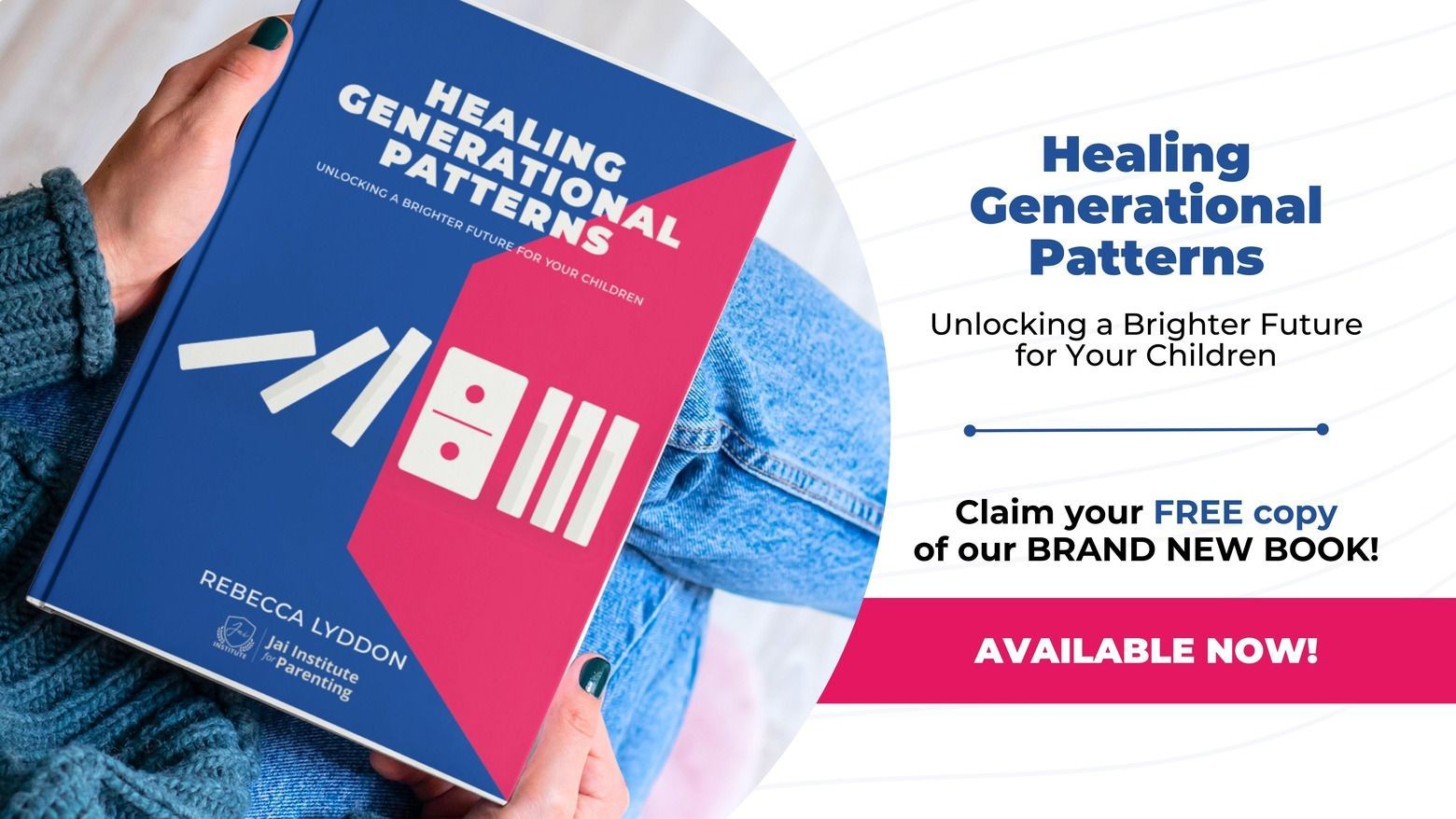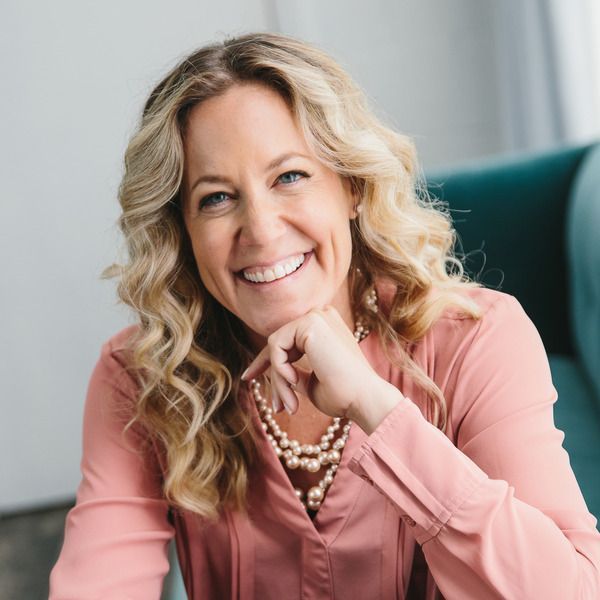How to Harness the Potential of Generational Patterns

Your Children’s Future Depends on You
I can’t stand to throw food away. I’ll hoard the two tablespoons of leftover chopped onion that I don’t need for a recipe. Food will stay in my refrigerator far longer than the USDA would recommend.
When I do have to throw food away? I feel panicked. And underneath that… a sense that “I failed.”
I’ve never experienced a day of food insecurity in my life. But… I’m only two to three generations removed from my ancestors who bravely crossed the ocean to escape persecution without a penny to their name. They settled in Pittsburgh, PA, where they found work in meat packing plants. Life was hard. Food was not certain.
These remnants of our ancestry trickle into our life experiences. Whether we get the memo explicitly or implicitly, we learn how the world works as it is passed down through lived experience, one generation to the next.
This is why it’s so useful to become a cycle breaker. Still, there’s greater potential here to not only
change generational patterns but also harness our knowledge that our life IS the roadmap that our children will be conditioned to follow. I wondered recently,
“What if we were more intentional about the generational patterns that we want our children to experience?”
In order to do this, it’s useful to understand how conditioned beliefs are formed through generations and their impact so that we can create more positive conditioned beliefs, perspectives, perceptions, and life skills for our children.
What is a Generational Cycle?
A generational cycle refers to a pattern of behaviors, beliefs, values, and cultural norms that tends to repeat across multiple generations within a family or a society. These cycles can encompass various aspects of life, including family dynamics, economic circumstances, social attitudes, and even psychological traits. Generational cycles are often characterized by the passing down of certain patterns, both positive and negative, from one generation to the next. These largely play out as conditioned beliefs.
Conditioned beliefs are formed through a combination of experiences, socialization, and exposure to information or stimuli. These beliefs are learned over time and can influence an individual's thoughts, behaviors, and perspectives. Here are some key ways in which conditioned beliefs are formed:
1. Childhood Experiences:
- Early experiences, particularly during childhood, play a significant role in shaping conditioned beliefs. Interactions with parents, caregivers, siblings, and peers can influence a child's perceptions of themselves and the world around them.
- Praise, criticism, encouragement, and punishment can all contribute to the formation of beliefs about one's worth, abilities, and the way the world works.
2. Cultural and Social Influences:
- Society and culture have a profound impact on conditioned beliefs. Cultural norms, values, and expectations can shape an individual's beliefs about what is considered right, wrong, acceptable, or unacceptable.
- Socialization through family, education, religion, and media can reinforce certain beliefs and perspectives.
3. Modeling Behavior:
- People often model their beliefs and behaviors after those they admire or respect. This modeling process can lead to the adoption of similar beliefs, whether positive or negative.
- For example, a child may adopt their parents’ political or religious beliefs simply because they observe their parents holding those beliefs.
4. Direct Learning:
- Some conditioned beliefs are learned through direct experiences. For instance, if someone has a negative experience with public speaking, they may develop a conditioned belief that they are not good at it.
- Similarly, positive experiences can lead to beliefs in one’s abilities or the effectiveness of certain behaviors.
5. Media and Information:
- Exposure to media, including news, television, movies, and the internet, can shape conditioned beliefs. Media often portrays certain groups, ideas, or behaviors in specific ways, influencing how individuals perceive them.
- Misinformation or biased reporting can contribute to the formation of inaccurate beliefs.
6. Traumatic Events:
- Traumatic events can have a profound impact on conditioned beliefs. Individuals who experience trauma may develop beliefs about themselves, others, or the world that reflect their traumatic experiences.
- These beliefs can lead to post-traumatic stress disorder (PTSD) and other mental health issues.
7. Repetition and Reinforcement:
- Beliefs can be reinforced through repetition. When individuals repeatedly hear or experience something, they are more likely to internalize and accept it as truth, even if it is not based on objective evidence.
- This phenomenon is often observed in advertising and propaganda.
8. Cognitive Biases:
- Cognitive biases, such as confirmation bias (seeking out information that confirms existing beliefs) and availability bias (giving more weight to readily available information), can further solidify conditioned beliefs.
The Impact of Conditioned Beliefs
Conditioned beliefs can have a significant impact on an individual’s thoughts, behaviors, and overall well-being. These beliefs are formed through repeated experiences, socialization, or exposure to certain information or stimuli. Here are some of the key impacts of conditioned beliefs:
1. Cognitive and Emotional Effects:
- Confirmation bias: Conditioned beliefs can lead individuals to seek out and interpret information in a way that confirms their existing beliefs, leading to cognitive biases and reinforcing those beliefs.
- Cognitive dissonance: When conditioned beliefs conflict with new information or experiences, individuals may experience discomfort, leading to attempts to rationalize or ignore conflicting evidence.
- Emotional attachment: People often develop strong emotional connections to conditioned beliefs, and challenging these beliefs can provoke anxiety, anger, or distress.
2. Behavior and Decision-Making:
- Guiding actions: Conditioned beliefs can influence a person’s decisions and behaviors, leading them to act in ways consistent with those beliefs.
- Inertia: Conditioned beliefs can create inertia, making it difficult for individuals to change their behavior even when they recognize that it would be in their best interest to do so.
- Self-fulfilling prophecies: If someone believes strongly in a particular outcome, their behaviors and actions may inadvertently contribute to that outcome, reinforcing the belief.
3. Social and Cultural Influence:
- Group conformity: Conditioned beliefs are often shared within social or cultural groups, encouraging conformity and discouraging dissenting viewpoints.
- Polarization: Strongly held conditioned beliefs can contribute to societal polarization by creating rigid boundaries between groups with differing beliefs.
- Stereotyping and prejudice: Conditioned beliefs can lead to the formation of stereotypes and prejudices, as individuals may generalize their beliefs about one person or group to others.
4. Limiting Potential:
- Closed-mindedness: Conditioned beliefs can close individuals off to new ideas, experiences, and perspectives, limiting personal growth and learning.
- Missed opportunities: People may miss out on valuable opportunities or experiences because their conditioned beliefs restrict them from exploring new possibilities.
- Stagnation: Conditioned beliefs can hinder personal development and prevent individuals from adapting to changing circumstances.
5. Mental Health:
- Stress and anxiety: When conditioned beliefs are negative or fear-based, they can contribute to chronic stress and anxiety.
- Self-esteem: Negative self-conditioned beliefs can erode self-esteem and self-worth, impacting mental health and overall happiness.
- Resilience: Positive conditioned beliefs can enhance an individual’s resilience and coping abilities in the face of adversity.
Not All Conditioned Beliefs are Negative or Harmful
Some beliefs can be empowering and motivating and align with an individual’s values and goals. However, it’s essential for individuals to critically examine their conditioned beliefs, be open to new information, and consider how these beliefs may be influencing their thoughts, actions, and overall well-being. As parents, doing this work is essential in creating a different roadmap for our children.
So our work, as
Peaceful Parents, is discernment. What are the beliefs that are supportive of our lives, and what beliefs are keeping us from a fulfilling, purposeful, and self-expressed life? Our motivation in doing this work, however, is not about us.
Healing from generational trauma, emotional wounding, and limited thinking will certainly make our lives better. But more importantly, it’s how we show our children the possibilities of living their more fulfilling, purposeful, and self-expressed lives.
How Do You Break Generational Cycles of Harm, Limits, and Fears?
Discovering your limiting beliefs is an important step in healing generational patterns of harm. These beliefs can often be subtle and deeply ingrained, so uncovering them requires self-awareness and introspection. Here are some steps to help you discover your limiting beliefs:
1. Self-Reflection:
- Spend time in quiet contemplation, journaling, or meditation. This can help you access your inner thoughts and feelings.
- Ask yourself probing questions such as: “What do I believe about myself, my abilities, and my potential?” “What thoughts or fears consistently hold me back?” “When do I feel the most self-doubt or insecurity?”
2. Explore Triggering Moments:
- Pay attention to situations or experiences that trigger strong emotional reactions, especially negative ones like fear, anxiety, or self-doubt. These emotional responses can be indicators of underlying limiting beliefs.
- Reflect on what specific thoughts or beliefs arise in these triggering moments. For example, if you feel anxious about public speaking, you might uncover a belief like “I’m not good enough” or “I’ll embarrass myself.”
3. Seek Feedback:
- Talk to friends, family members, or a trusted therapist or coach. Sometimes, others can provide valuable insights into your behavior and beliefs, as they may see patterns or tendencies that you’re not aware of.
- Ask for honest feedback about how they perceive your self-talk, behaviors, or areas where you seem to hold yourself back.
4. Identify Patterns:
- Look for recurring patterns in your life where you consistently face challenges, setbacks, or obstacles. These patterns may be connected to your limiting beliefs.
- Consider areas such as relationships, career, health, or personal development. Do you find yourself repeatedly encountering similar issues or limitations?
5. Challenge Assumptions:
- Question the validity of your beliefs. Are they based on facts or assumptions? Are they grounded in past experiences or fear of the unknown?
- Ask yourself if there’s evidence that supports or contradicts these beliefs. Often, limiting beliefs are based on unfounded assumptions.
6. Use Affirmations:
- Develop positive affirmations that counter your limiting beliefs. For example, if you have a belief that you're not good at public speaking, create an affirmation like “I am confident and capable of speaking in public.”
- Repeat these affirmations regularly to reprogram your subconscious mind.
7. Keep a Belief Journal:
- Create a belief journal where you document your thoughts, beliefs, and any changes or challenges you encounter while working on identifying and overcoming limiting beliefs.
- Review your journal periodically to track your progress and insights.
8. Seek the support of a Parenting Coach (or become one yourself!)
- Many of our conditioned beliefs live in our blind spots and defense mechanisms. Working with a coach will allow you to have the professional support of a skilled advocate who can provide empathy and accountability for you to make positive changes that will benefit your children!
Remember that discovering and addressing limiting beliefs is an ongoing process. It may take time and effort, but the awareness you gain can be a powerful tool for personal growth and self-improvement.
Reverse Engineering Empowering Generational Patterns
Imagine your child 20-30 years from now. What kind of life do you hope they have? What are the values that you dream they hold dear? What are the life lessons they learned from you that you see them carrying forward in their lives?
I know this quote is about as trite as they come, but “Be the change you wish to see in the world” (thank you, Mahatma Gandhi) takes on a very clear direction when we think about it in terms of raising our children. Because (one of our often repeated quotes here at The Jai Institute) “Children do as we DO, not as we say.”
Creating a Cohesive Narrative for Appreciation of Our Forebears’ Experience
The Power of Our Stories
One of the best tools to allow our children to experience the positive lessons of our own lives and that of our ancestors is to talk about them. Children have a longing to belong and to be included. Let them in on your growth. Share your before’s and after’s. Share the story of your lineage, and if there are relatives who have their own stories to share, create the space for this transmission.
We can think of this as “talk your walk.” If there are patterns of behavior or ways that you are working to shift how you respond, react, or interpret the world, share your journey with your children in age-appropriate ways.
The magical thing about limiting, conditioned beliefs is that they don’t hold up with consistent, irrefutable evidence that they aren’t true. Stories about our identity that keep us small or rob us of our power quiet as we show ourselves that we don’t need to play by the “conditioned-beliefs-rule-book.”
In this way, we give our children the path to escape the less-than-useful experiences of the past because we are intentionally bringing them along for the healing.
Living Your Best Life
Living your best life is the greatest gift for your children. Striving for excellence, pursuing your passions, staying positive and optimistic, finding work that you love, being a person of integrity and honesty, cultivating healthy relationships, taking care of your health…
These can be the
Generational Patterns lovingly passed on to your children’s children’s children.
Meet Your Author, Kiva Schuler
Jai Founder and CEO
Kiva’s passion for parenting stemmed from her own childhood experiences of neglect and trauma. Like many of her generation, she had a front row seat to witnessing what she did not want for her own children. And in many ways, Jai is the fulfillment of a promise that she made to herself when she was 16 years old… that when she had children of her own, she would learn to parent them with compassion, consistency and communication.
Kiva is a serial entrepreneur, and has been the marketer behind many transformational brands. Passionate about bringing authenticity and integrity to marketing and sales, she’s a sought after mentor, speaker and coach.
Share This Article:
Curious for more?















